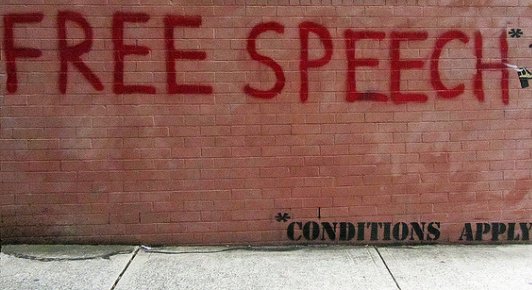Mark Western: Free Speech 101

I used to be a high school government teacher. I can remember many different times in which a student said something inappropriate, and then tried to explain to me that they could say whatever they wanted because of the “freedom of speech.” It’s unfortunate how often this happens.
There has been a lot of discussion lately regarding the “freedom of speech” applied towards whether a particular person or political viewpoint can speak at a college or at a gathering. The phrase “freedom of speech” has recently been used both as a sword and as a shield; but there is often little or a misguided understanding about what comprises the freedom of speech. When we don’t know what is meant by “free speech”, our political discourse is ultimately unproductive. I think it’s time that we try to clear up some lingering confusion.
The First Amendment to the United States Constitution provides that “Congress shall make no law . . . . abridging the freedom of speech”. The freedom of speech does not include libel or slander (making false statements either in writing or verbally), it does not include incitement (provoking lawlessness—think DAPL); the freedom of speech also does not include obscenity (the definition of which is more amoeba like). The First Amendment is supposed to protect political speech—the type of speech that may be unpopular but still can be presented in the marketplace of political ideas. To be clear, hateful speech can also be constitutionally protected, assuming that it does not slide into unprotected speech, i.e., libel or slander, or incitement.
[mks_pullquote align=”right” width=”300″ size=”24″ bg_color=”#ffffff” txt_color=”#000000″]Roy Moore’s viewpoints about homosexuality and Peter Tefft’s views about race are largely hateful. But the First Amendment protects their ability to make their case.[/mks_pullquote]
Here is an example- a person who carries a banner outside the US Courthouse in Minot that states “Donald Trump’s (or fill in the blanks with any other person for that matter) political views are idiotic and misguided and hateful” is making speech that is protected by the First Amendment. If, however, the speaker or banner (or Facebook post) tries to convince their audience that they should inflict bodily harm on the President or other senseless lawlessness, it is not free speech.
To be fair, “freedom of speech” does not necessarily apply towards conduct in the business world. You can have a political opinion about something, but an employer can prohibit political expression at your job. Oliver Wendell Holmes, Jr. once write “an employee may have a constitutional right to talk politics, but he has no constitutional right to be employed.” You can express your views about a political issue on Facebook, but that doesn’t mean that Facebook (which is a private business entity) is obliged to let you say anything you see fit. Likewise, Facebook (or any entity that publishes “stuff” on the web) can remove comments as it sees fit.
Concordia College is a private higher education institution. It does not have to be an open forum for anything, much less conservative or liberal political speakers. It can invite who it sees fit to invite, and rescind invitations for whatever reason. Concordia College is not public property. It does not have to let anyone who is not an employee or student be on campus. The “freedom of speech” does not mandate that Concordia College permit all political viewpoints (or any for that matter) to come to campus. If a person doesn’t like how Concordia determines curriculum, speakers, or anything else, they are free to not attend Concordia.
Slightly different considerations apply for public institutions, venues, spaces, parades, etc, because they are supposed to be open to everyone. We too often assume that “freedom of speech” permits a person to say (or write) anything, anytime, anywhere. That’s not so, but we’re not turning into a Soviet gulag here, folks. It is just important to consider that the freedom of speech that is enshrined in the Bill of Rights is not carte blanche to say anything, anytime, anyplace, and to anyone. But likewise, the freedom of speech is intended to protect unpopular viewpoints, even abhorrent viewpoints that will hopefully lose in the marketplace of political ideas. Roy Moore’s viewpoints about homosexuality and Peter Tefft’s views about race are largely hateful. But the First Amendment protects their ability to make their case.
The marketplace is rejecting their viewpoints, and that’s the whole point of the freedom of speech.




